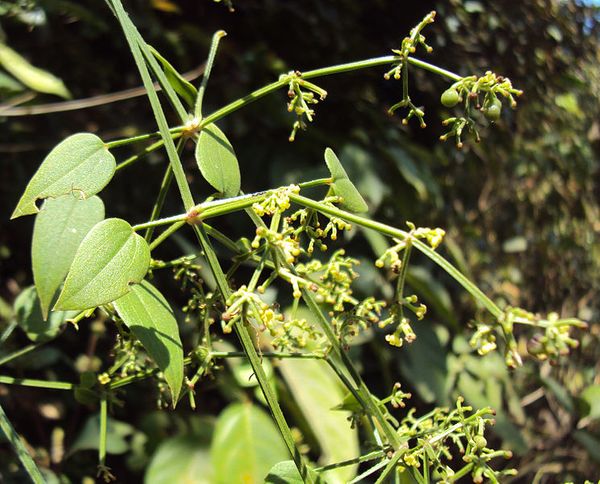Manjistha (Rubia Cordifolia) sometimes referred to as Indian madder, is a significant folk herb in Ayurveda that has been used to treat a lot of health problems. It’s been regarded as a blood-purifying herb in Ayurveda. Manjistha is primarily used for thinning blood clots and restoring normal blood flow. This plant can be applied externally, therefore it can be used as a skin whitener. Manjistha powder contains antioxidant characteristics that help it treat acne and pimples while preventing bacteria from growing on the face, which is another advantage of applying it to the skin together with rose water or honey. Let’s check out Manjistha medicinal uses and Manjishtha health benefits.
Nutrition and Nutrients of Manjistha
Quinones, iridoids, oleananes triterpenoid, bicyclic hexapeptides, and anthraquinones are among the many chemical components found in Manjistha. The anthraquinones alizarin, purpurin, and rubicordifolin are some of note. The roots of Manjistha also contain carbs and amino acids in addition to numerous phytochemicals. (source)
Also Read: What is Arjuna? Uses and Health Benefits of Arjuna
Manjishta Medicinal Uses: Know Various Therapeutic Uses Of Manjistha
- Manjistha reduces oedema, speeds up wound healing, and restores the skin’s natural texture. Making a mixture with coconut oil and manjistha powder promotes rapid healing and lessens inflammation.
- Manjistha has historically been used to treat liver fluke, intestinal worms, wounds, diarrhoea, and maggots in animals.
- Blood purification with manjistha is a frequent practise. Along with calcium channel blocking, it also has anti-diabetic, anti-stress, and anti-platelet activities.
- It is used to treat skin conditions and has anticancer activity.
- Antimicrobial, hepatoprotective, antifungal, immunomodulatory, hypotensive, anti-inflammatory, analgesic, antimalarial, antioxidant, antileukemic, and mutagenic are only a few of the biological effects of the anthraquinones contained in Manjistha. (source)
Health Benefits Of Manjistha – Indian Madder
Health Benefits Of Manjistha In Treating Cancer
Significant anticancer action was demonstrated by Rubia’s cyclic hexapeptides and quinones against a variety of growing cells.

Cyclic hexapeptide had anticancer effect against leukemia cell lines that were comparable to deoxy-bouvardin but less potent than vincristine.(source)
How Manjistha Helps In Preventing Liver Damage
In numerous animal studies, manjistha extract has demonstrated hepatoprotective (preventing liver damage) action. In a rat model, rubiadin, a key component of Manjistha root extract, also shown strong hepatoprotective activity against liver injury. (source)
Benefits Of Manjistha In Balancing Blood Sugar Levels
The root extract of Rubia cordifolia shows hypoglycemic activity due to the presence of various bioactive components. Administration of the root extract showed significant hypoglycemic activity in an animal study. (source)
Manjistha Health Benefits for Diarrhea
The herb manjistha is excellent for treating diarrhea. In Ayurveda, diarrhea is referred to as Atisar. It is brought on by unhealthy eating, contaminated water, pollutants, mental tension, and Agnimandya (weak digestive fire). These things collectively cause Vata to become aggravated. This increased Vata causes fluid from various body tissues to enter the intestine and mingle with the faeces. This results in diarrhoea or loose, watery bowel movements. Manjistha aids in reducing diarrhea. This is because it has Deepan (appetiser) Pachan (digestive) qualities, which promote digestive fire. As a result, the frequency of motion is decreased and the stool becomes thick. Manjistha’s Kashaya (astringent) properties also help it to stop bleeding.
Manjistha Helps In Healing Wounds
Manjistha reduces edoema, speeds up wound healing, and restores the skin’s natural texture. Making a mixture with coconut oil and manjistha powder promotes rapid healing and lessens inflammation. This is as a result of its balancing and Ropan (healing) qualities. (source)
Precautions You Should Take Before Using Manjistha
- If you have gastritis or hyperacidity, talk to your doctor before using Manjistha.
- Before taking Manjistha during breast-feeding, consult your doctor.
- Before taking Manjistha during pregnancy, speak with your doctor.
Side Effects Of Manjistha
Information on the safety of oral ingestion and topical use of Manjistha is lacking. So, only use this herb if your doctor says so.
These are some of the Manjistha medicine uses and health benefits along with the precautionary measures and side-effects. To know more about such Ayurvedic herbs, explore Healthy Herbs.
Featured Image Source Credits: Vinayaraj, CC BY-SA 3.0 https://creativecommons.org/licenses/by-sa/3.0, via Wikimedia Commons.





